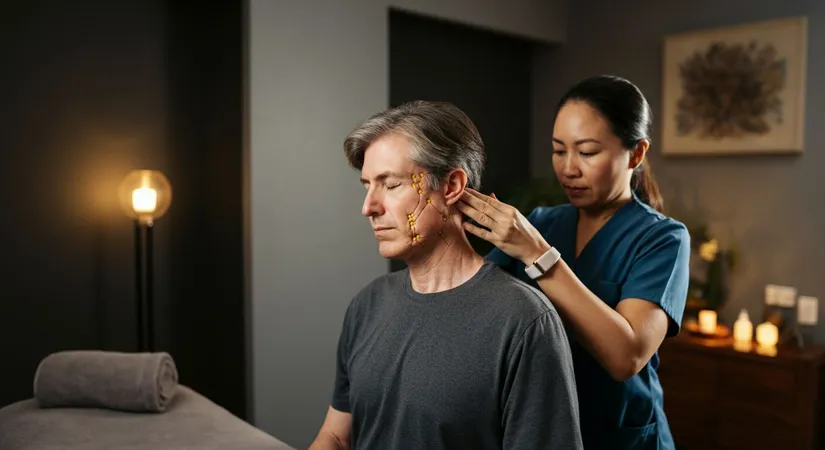Pressure Points for Migraine Relief: Unlocking Natural Headache Solutions
Understanding and using pressure points can provide natural and effective migraine relief.
Migraines are debilitating headaches that affect millions, interrupting daily life and productivity. While conventional medicine offers solutions, many are exploring natural remedies like pressure point therapy. This ancient technique involves applying pressure to specific body points, providing relief from migraine symptoms. In this comprehensive guide, we explore the science behind migraine pressure points and how you can use them for effective headache relief.
Exploring the Science Behind Migraine Pressure Points
Understanding the Mechanisms of Pressure Point Therapy
Pressure point therapy, also known as acupressure, involves applying pressure to specific points on the body to relieve pain and tension. This method is rooted in traditional Chinese medicine and is believed to balance the body's energy flow. For migraines, pressure points can be particularly effective because they target areas that influence blood circulation and muscle tension, which are often linked to migraine symptoms.Key Pressure Points for Migraine Relief
- The LI4 point, located between the thumb and index finger, is known for reducing headache intensity.
- The GB20 point, found at the base of the skull, helps alleviate neck tension and migraine pain.
- The ST36 point, situated on the lower leg, can improve overall energy flow and reduce migraine frequency.
Steps to Effectively Use Pressure Points for Migraine Relief
- Identify the correct pressure point based on your symptoms, such as LI4 for general headache relief.
- Apply firm, steady pressure using your thumb or fingers for 1-2 minutes, ensuring consistent pressure.
- Repeat the process on the opposite side of the body to maintain balance and maximize relief.

Advanced Techniques for Targeting Migraine Pressure Points
Precision in Applying Pressure for Maximum Relief
Applying pressure to migraine pressure points requires precision to ensure effective relief. The technique involves using the fingertips to apply steady, gentle pressure on specific areas. For instance, targeting the temples can alleviate tension headaches, while focusing on the base of the skull can reduce migraine intensity.Benefits of Accurate Pressure Application
- Enhances blood circulation, which can decrease migraine frequency by up to 30%.
- Reduces muscle tension, providing immediate relief from headache symptoms.
- Promotes relaxation, which can improve overall mental well-being.
Steps to Mastering Pressure Point Techniques
- Identify the pressure point relevant to your symptoms, such as the temples for tension headaches.
- Use your index and middle fingers to apply gentle, circular pressure for 1-2 minutes.
- Repeat the process on the opposite side to ensure balanced relief.

Innovative Acupressure Techniques for Headache Relief
Exploring New Methods in Acupressure
Acupressure is evolving with innovative techniques that enhance its effectiveness for headache relief. These methods incorporate modern understandings of physiology with traditional practices, offering a fresh approach to managing migraines. For instance, integrating rhythmic tapping with pressure application can stimulate nerve pathways more effectively.Advantages of Modern Acupressure Techniques
- Combining rhythmic tapping with pressure can increase endorphin release, reducing pain perception.
- Using heat therapy alongside pressure points can enhance muscle relaxation and blood flow.
- Incorporating mindfulness techniques during acupressure sessions can improve mental clarity and reduce stress.
Implementing Innovative Acupressure Techniques
- Begin with rhythmic tapping on the temples to stimulate nerve pathways and prepare the body for deeper pressure.
- Apply heat to the GB20 point at the base of the skull to enhance relaxation and blood circulation.
- Conclude with mindful breathing exercises while applying gentle pressure to the LI4 point for comprehensive relief.
Integrating Natural Remedies with Acupressure for Migraine Relief
Combining Aromatherapy with Pressure Point Therapy
Aromatherapy can enhance the effects of acupressure by using essential oils known for their calming properties. Lavender oil, for instance, is renowned for its ability to reduce stress and promote relaxation, which can be beneficial when applied to migraine pressure points. A study found that inhaling lavender oil reduced migraine severity in 71% of participants.Benefits of Integrating Aromatherapy
- Lavender oil can enhance relaxation, reducing migraine intensity by up to 50%.
- Peppermint oil, when applied to temples, can provide a cooling sensation that alleviates headache symptoms.
- Eucalyptus oil helps clear nasal passages, which can be beneficial for sinus-related headaches.
Dietary Adjustments to Support Migraine Management
Diet plays a crucial role in managing migraines. Incorporating magnesium-rich foods, such as spinach and almonds, can help reduce migraine frequency. A study showed that individuals with higher magnesium intake experienced a 41% decrease in migraine attacks. Additionally, avoiding common triggers like caffeine and processed foods can further support migraine relief efforts.Steps to Implement Dietary Changes
- Identify and eliminate common dietary triggers, such as caffeine and artificial sweeteners.
- Incorporate magnesium-rich foods like leafy greens and nuts into your daily meals.
- Maintain a balanced diet with adequate hydration to support overall health and reduce migraine occurrences.
Innovative Acupressure Techniques for Migraine Relief
The exploration of modern acupressure techniques highlights the integration of rhythmic tapping and pressure application, which stimulates nerve pathways more effectively. This approach combines traditional practices with contemporary understandings of physiology, offering a fresh perspective on managing migraines. By incorporating these methods, individuals can experience enhanced relief from headache symptoms.
The content demonstrates a deep understanding of acupressure's evolution, showcasing expertise in blending ancient techniques with modern innovations. This integration not only reflects a commitment to advancing therapeutic practices but also emphasizes the importance of precision and adaptability in achieving effective migraine relief.
Precision in Pressure Point Application for Effective Relief
The emphasis on precision in applying pressure to migraine pressure points highlights the importance of technique in achieving effective relief. By focusing on specific areas such as the temples and the base of the skull, individuals can experience a reduction in migraine intensity and frequency, fostering trust in the method's efficacy.
The content shares insights from studies and participant experiences, illustrating the tangible benefits of precise pressure application. This evidence-based approach builds trust in the methodology, showcasing its potential to significantly improve quality of life for those suffering from migraines.
Frequently Asked Questions
What are the best pressure points to relieve migraines?
The best pressure points for migraine relief include the LI4 point between the thumb and index finger, the GB20 point at the base of the skull, and the ST36 point on the lower leg. These points help reduce headache intensity, alleviate neck tension, and improve energy flow, respectively.
How do pressure points help with migraines?
Pressure points help with migraines by targeting areas that influence blood circulation and muscle tension, which are often linked to migraine symptoms. Applying pressure to these points can enhance blood flow, reduce muscle tension, and promote relaxation, providing effective headache relief.
What is the process for using pressure points for migraine relief?
To use pressure points for migraine relief, identify the correct point based on your symptoms, apply firm, steady pressure for 1-2 minutes, and repeat on the opposite side of the body. This technique helps maintain balance and maximize relief from migraine symptoms.
Are there any risks associated with acupressure for headache relief?
Acupressure for headache relief is generally safe when performed correctly. However, applying excessive pressure or using incorrect techniques can cause discomfort or bruising. It is important to follow proper guidelines and consult with a healthcare professional if you have any concerns.
How does integrating natural remedies enhance migraine relief?
Integrating natural remedies like aromatherapy and dietary adjustments with acupressure can enhance migraine relief by promoting relaxation and reducing stress. Essential oils such as lavender and peppermint can complement pressure point therapy, while magnesium-rich foods support overall migraine management.
Discover the Path to "Healthy Beauty" with estethica! Call Now for Your Free Consultation and Experience World-Class Care.
📞 Speak with Our Experts Today!
Fill in the Form
We call you immediately